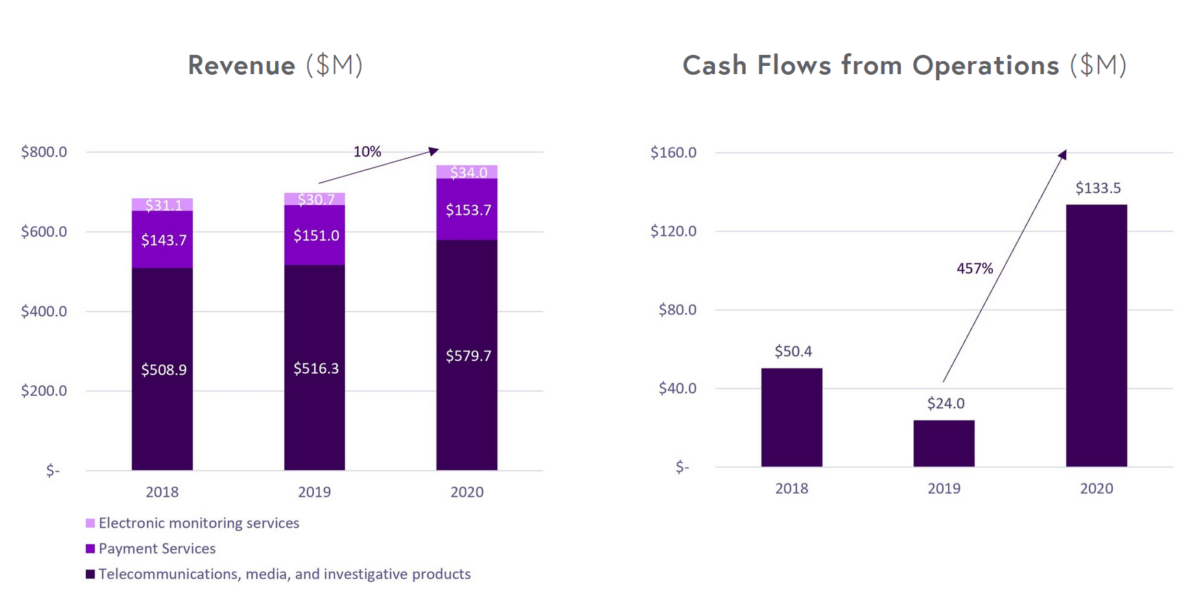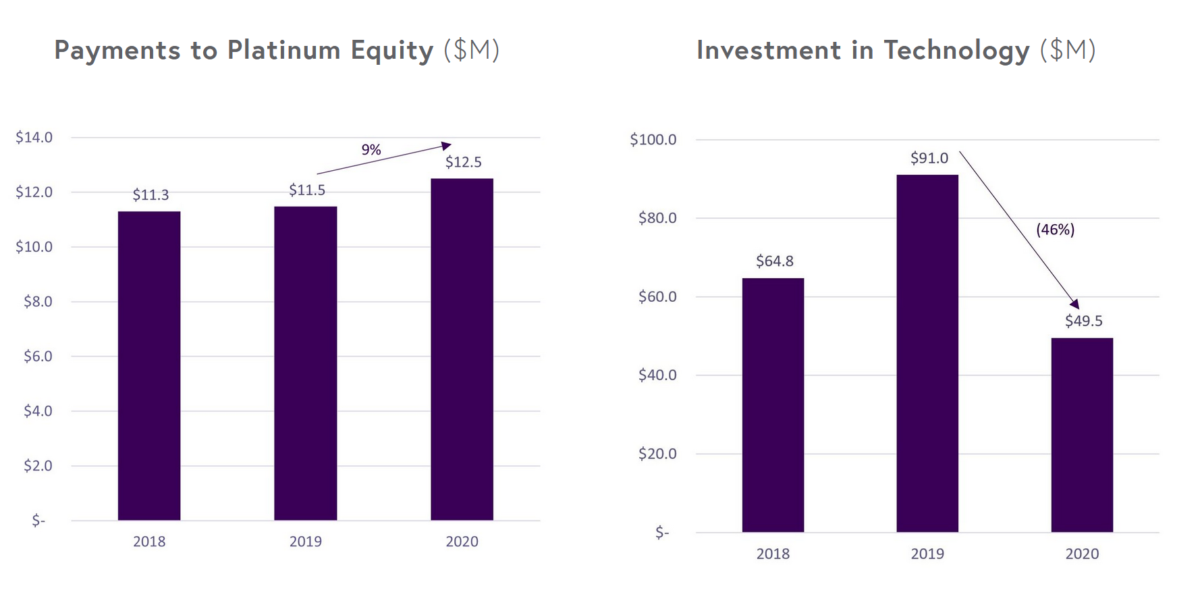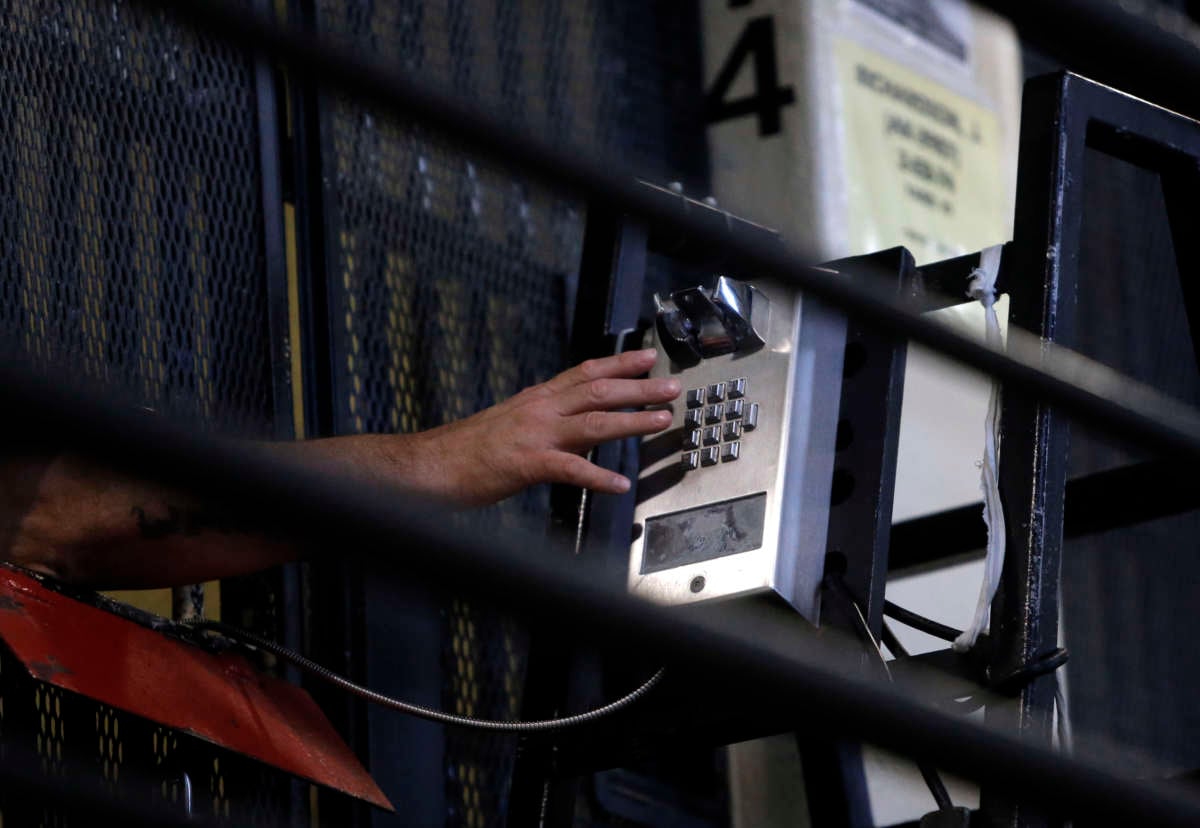Honest, paywall-free news is rare. Please support our boldly independent journalism with a donation of any size.
Recently released financial statements for Aventiv Technologies – the parent company of Securus Technologies – reveal that the prison telecom corporation capitalized on the COVID-19 public health crisis to rake in massive gains on the backs of struggling families.
Prior to the COVID-19 pandemic, Securus’ valuation was plummeting after months of bad headlines and pivotal wins by prison phone justice advocates. Its debt traded at distressed levels as low as 47 cents on the dollar, suggesting that the corporation could be worth as little as $693 million, a significant departure from the $1.6 billion Platinum Equity paid for the corporation in November 2017.
But the pandemic offered the corporation the gift it needed to recover: the end of visits, a policy it had long hoped for and, at one time, even tried to force.
Just a few years ago, Securus was contractually requiring facilities to end or limit visits to force families to use their costly phone and video calling services. The corporation stopped this practice in response to public outrage, and some states even passed laws to protect visits. But when the pandemic hit and all prisons and jails across the country shuttered their visit rooms – those who still had them – Securus’ dreams became reality.
Call volume skyrocketed, and with it, Securus’ revenue. A recent study of call volume in three jails showed that while their populations were down due to COVID-19 related releases, call volume was up. A Worth Rises analysis of call volume in San Francisco jails between August 2019 and August 2020 revealed that call volume was up 51 percent per person.
As it has many times before, Securus went as far as to install video kiosks for on-site video calls in previously designated visit rooms, making it much more difficult to reinstate visits. The move guarantees that the windfall created by the pandemic is sustained as the world recovers. It also flies in the face of claims made by Platinum Equity executive to investors that the corporation supports the “co-existence of video and in-person visitation.”
But there’s more. The pandemic also interrupted legislative sessions that were considering free prison communication bills, distracted the public from a slew of bad press, and gave Securus the opportunity to play the hero in connecting families with their incarcerated loved ones, which it exploited with weekly press releases about its calling assistance program.
In reality, Securus, and other prison telecom vendors, remained the barrier to communication for families and their incarcerated loved ones through the pandemic. Families that were disproportionately Black, brown, and cash-poor – the same families disproportionately impacted by the health and economic fallout of the pandemic – were financially scrambling to find ways to connect with their loved ones inside. And they did, to Securus’ benefit.

In 2020, Securus’ revenues grew 10 percent, or $69.5 million, to $767.5 million, compared to just 2 percent in 2019. During the pandemic, every business line – phone calls, video calls, tablets, payment services, and electronic monitoring – experienced growth. Electronic monitoring, which had been declining, actually outpaced the others thanks to the overuse of electronic monitoring in COVID-19 related releases.
Even more incredibly, Securus’ operating income more than doubled to $80.3 million, EBITDA (a key financial metric) grew 41 percent to $209.2 million, and net cash flow from operating activities grew nearly five-fold to $133.5 million between 2019 to 2020. And Platinum Equity, led by Detroit Pistons-owner Tom Gores, cashed out.
Platinum Equity took a $2.3 million payout in 2020 on top of its annual $10.2 million management fee, compared to a $1.3 million payout in 2019. The financials actually revealed that since acquiring Securus in 2017, Platinum Equity has paid itself $35.3 million though Gores has publicly claimed to be reinvesting profits in improving the Securus’ operations and product infrastructure. The problem is that these payouts are not considered profit. In fact, under his management, Securus has actually never recorded a profit.
And that is not because they are increasing their investment in infrastructure, as promised. To the contrary, investments in infrastructure decreased by 46 percent between 2019 and 2020 and were disproportionately made in electronic monitoring and tablets. Instead, it is largely because Securus writes off nearly 17 percent of its revenue as a depreciation and amortization expense and pays nearly $100 million in interest payments on the $1.2 billion Platinum Equity borrowed to buy the corporation.

One of the many unfortunate realities of the pandemic is that it gave Securus an opening to realize their vision of replacing visits with communications technology under the guise of public health. As a result, today, Securus’ valuation has bounced back to as much as $1.5 billion, still not what Platinum Equity paid for it, but much better than where it was pre-pandemic. Meanwhile, families are struggling more than ever to connect with their loved ones behind bars and keep their rent paid, lights on, and food on the table.
However, as the world begins to reopen and the pandemic moves behind us, prison phone justice advocates are committed to testing the sustainability of Securus’ recovery, and they have already seen significant wins in 2021. The FCC and state regulators have moved to reduce rate caps for prison and jail calls. Connecticut, Los Angeles, and San Diego all passed policies to make calling free from their prisons and jails, and new campaigns are popping up in a diversity of cities and states weekly. If their previous success in targeting Platinum Equity, Securus, and Tom Gores is any indicator, this rebound is temporary.
Media that fights fascism
Truthout is funded almost entirely by readers — that’s why we can speak truth to power and cut against the mainstream narrative. But independent journalists at Truthout face mounting political repression under Trump.
We rely on your support to survive McCarthyist censorship. Please make a tax-deductible one-time or monthly donation.
